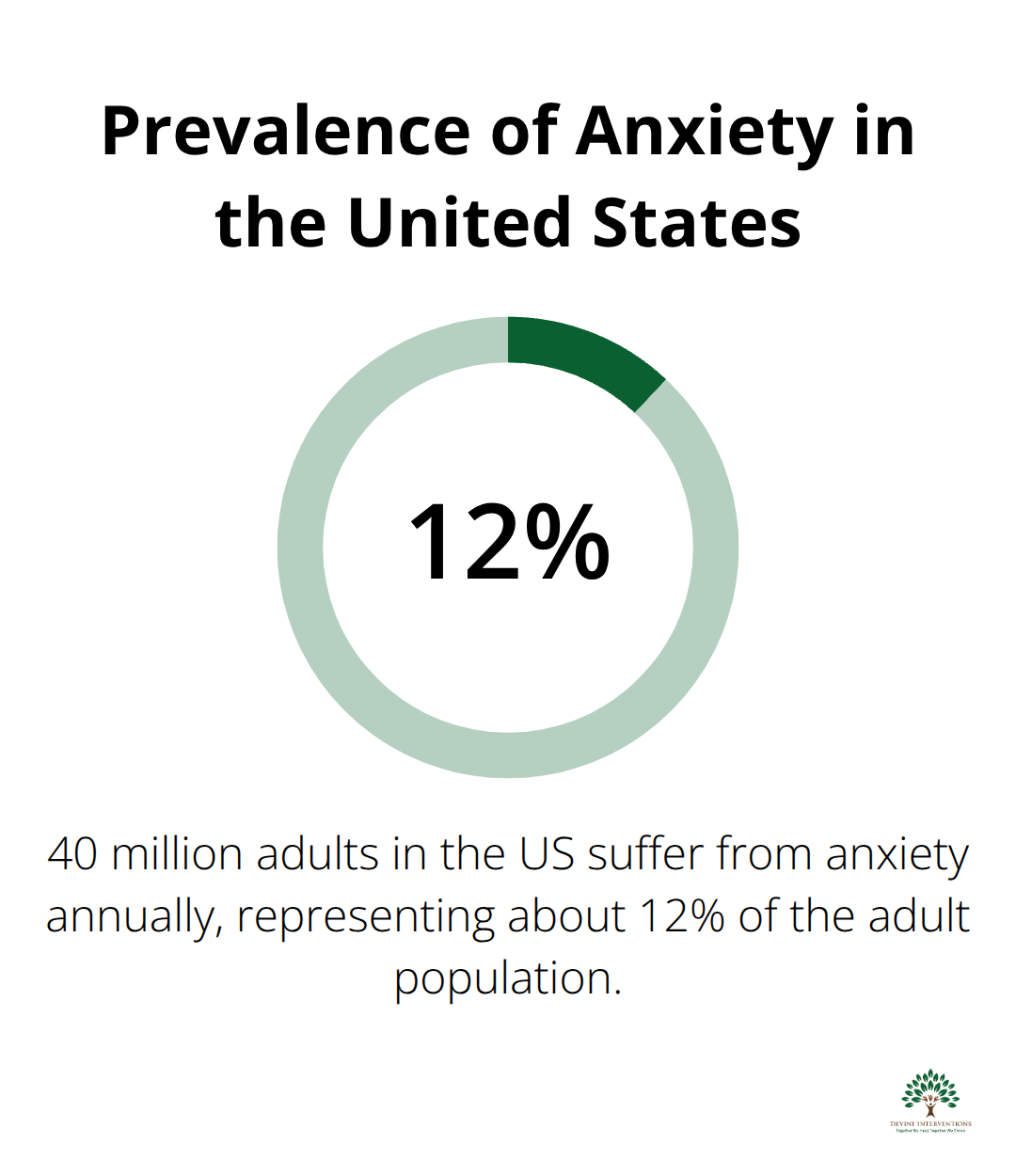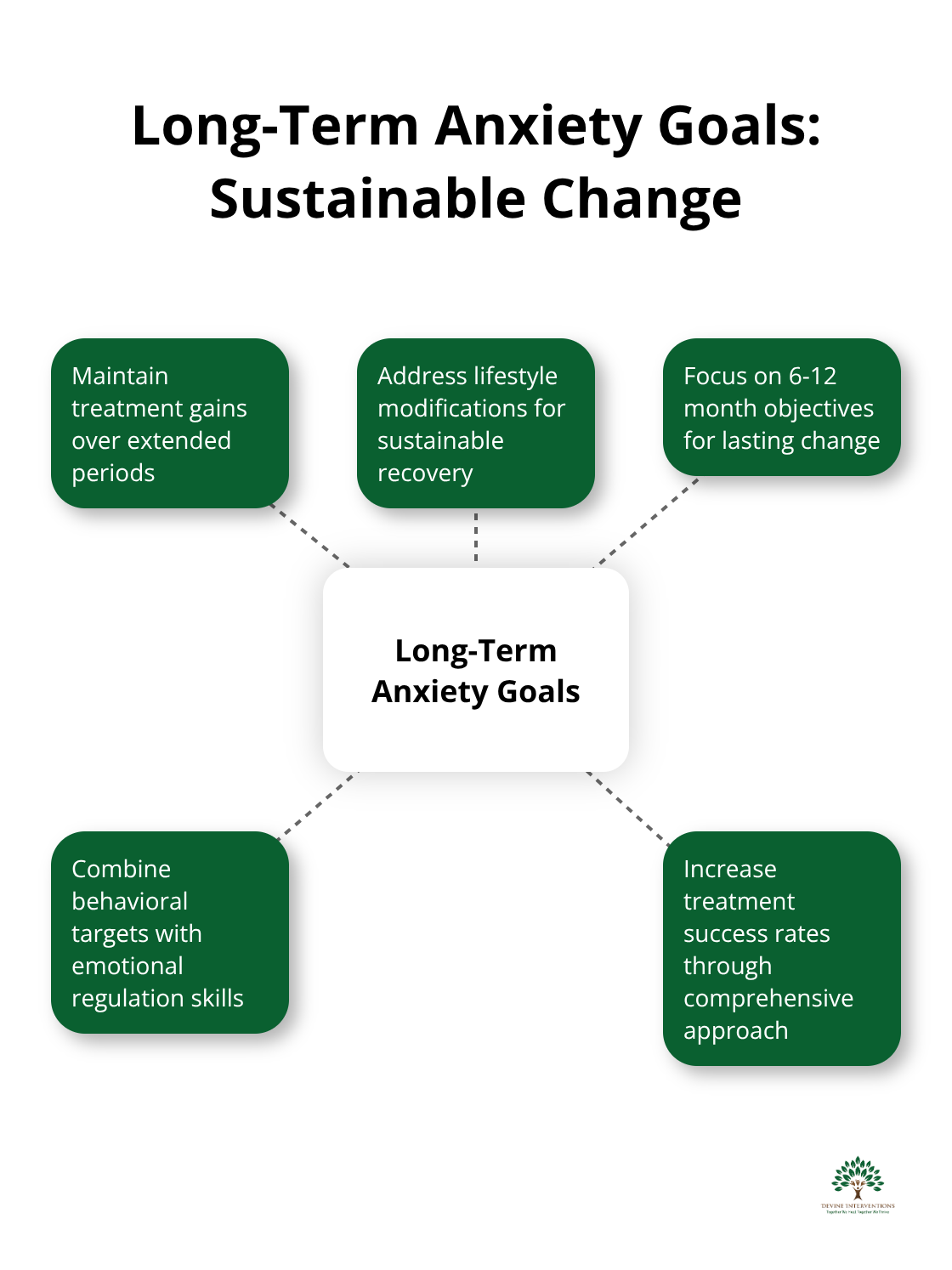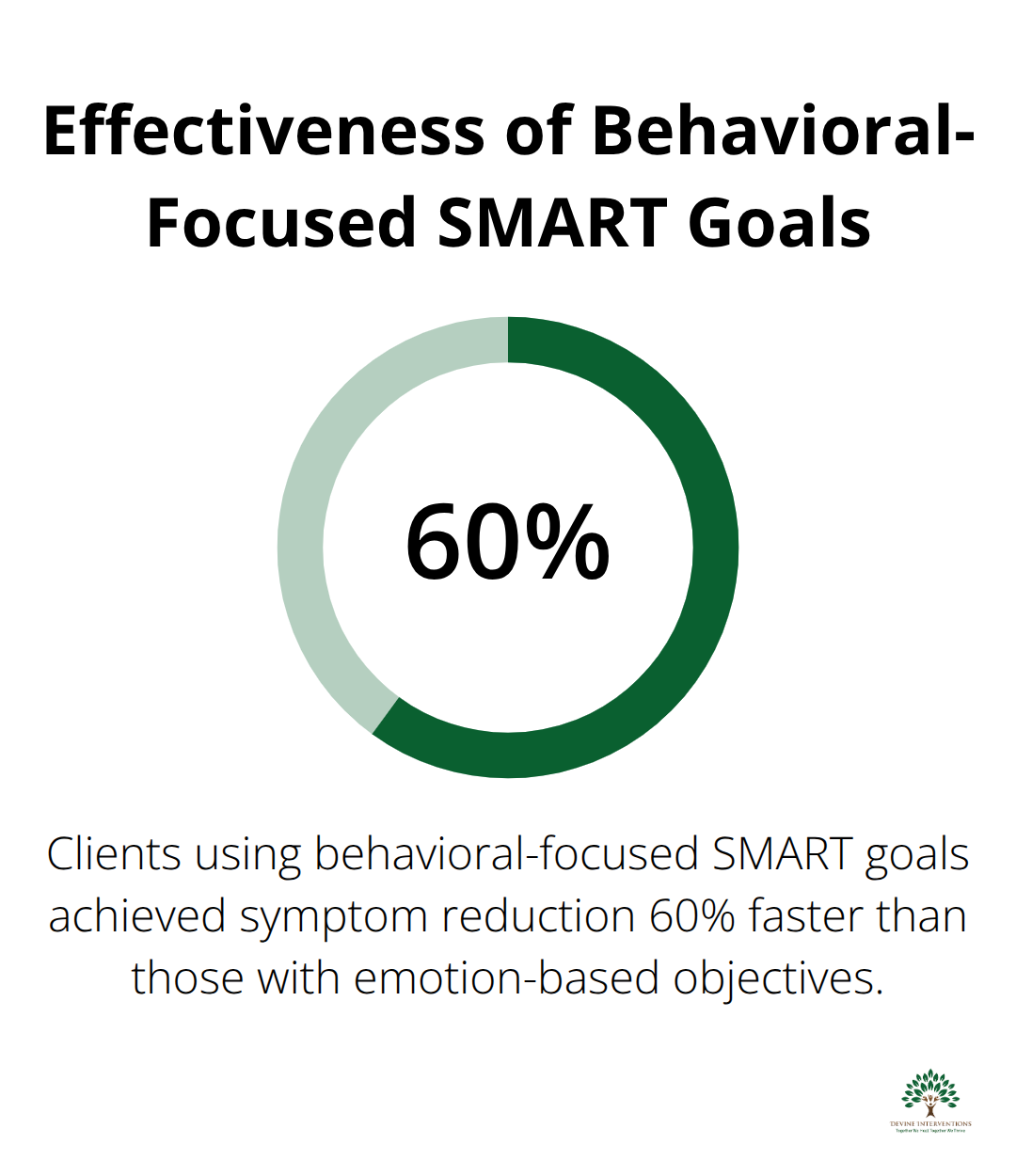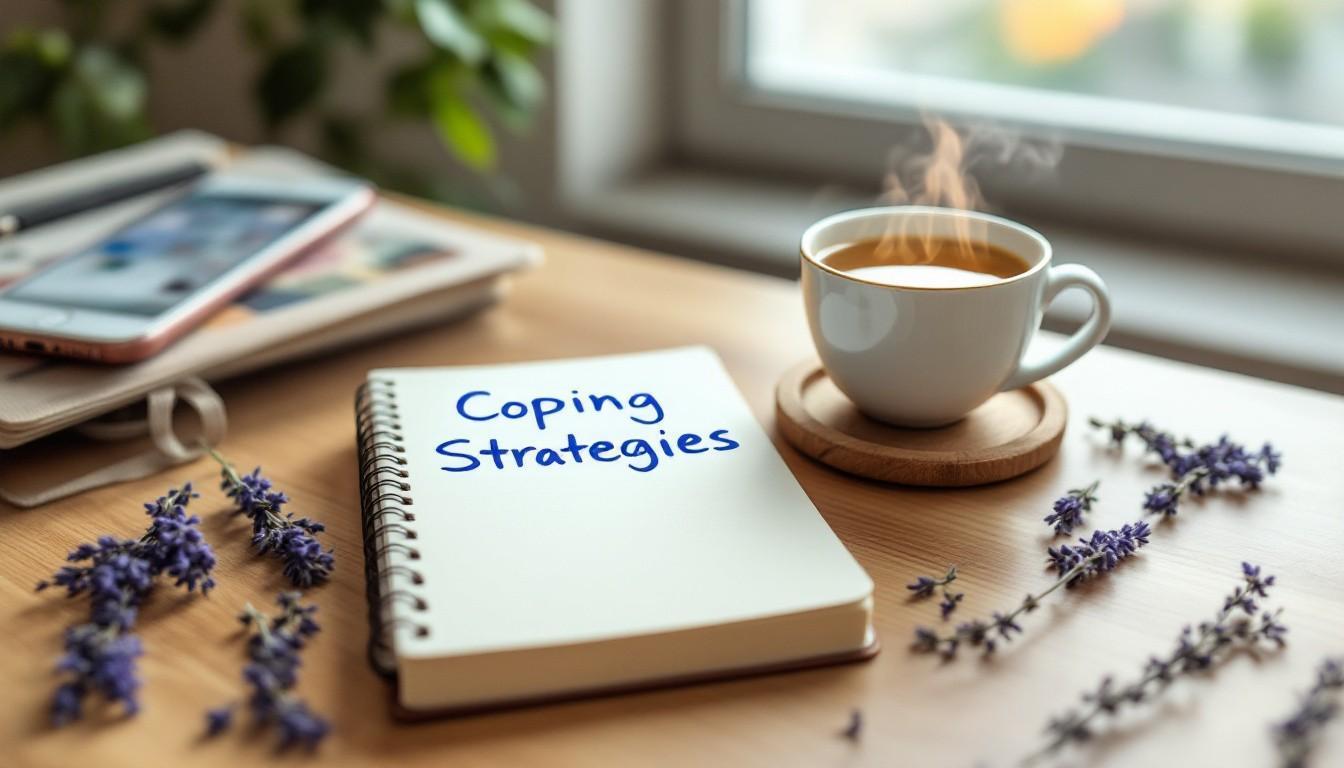Anxiety affects 40 million adults in the United States each year, making everyday tasks feel overwhelming and unmanageable. Without clear direction, therapy sessions can feel aimless and progress becomes difficult to measure.
We at Devine Interventions understand that setting specific counseling goals for anxiety transforms your treatment experience. Well-defined goals provide structure, track meaningful progress, and build the confidence needed for lasting recovery.

Why Anxiety Goals Must Be Specific and Measurable
Anxiety creates persistent worry, rapid heartbeat, sweating, muscle tension, and concentration problems. These symptoms disrupt work performance, strain relationships, and limit social activities. 40 million Americans suffer from anxiety, with untreated cases leading to increased healthcare utilization and complications. Physical consequences include sleep disruption, digestive issues, and chronic fatigue that amplify daily struggles.
Vague Intentions Create Treatment Roadblocks
Generic goals like “feel less anxious” or “worry less” offer no clear path forward. The Journal of Clinical Psychology published research that shows clients with specific, measurable goals achieve 42% better outcomes than those with vague objectives. SMART goal setting for mental health involves creating goals that are Specific, Measurable, Achievable, Realistic, and Timed such as “attend two social events weekly without panic symptoms” or “reduce GAD-7 anxiety scores from 15 to 10 within eight weeks” establish clear targets. These concrete objectives help your brain focus on achievable actions rather than overwhelming concepts. Therapy sessions lose direction and progress becomes impossible to track without this specificity.
Measurable Progress Builds Treatment Momentum
Standardized tools like the GAD-7 or Beck Anxiety Inventory provide objective evidence of improvement through consistent tracking. Clients experience significant motivation increases when they watch their anxiety scores drop from severe to moderate ranges (a measurable shift that validates their efforts). Small victories accumulate into major breakthroughs over time. Successfully practicing deep breathing for 10 minutes daily builds confidence to tackle larger exposure exercises later in treatment. Measurable goals transform abstract healing concepts into concrete achievements, which creates positive feedback loops that accelerate recovery.
Goal Specificity Enhances Therapeutic Focus
Specific anxiety goals direct both client and therapist attention toward targeted interventions. Rather than wandering through general discussions about worry, sessions focus on precise skill development and symptom management strategies. Treatment goals must include concrete behavioral targets that clients can practice daily, with weekly progress reviews that adjust interventions based on measurable outcomes. This targeted approach maximizes the value of each therapeutic hour and creates accountability for both parties involved in the treatment process.
What Anxiety Goals Work Best
Immediate relief goals focus on crisis management and daily function improvements within the first month of treatment. Research shows that clients who master one coping technique weekly during the initial treatment phase achieve faster symptom reduction compared to those without structured short-term targets. These goals include deep breathing exercises practiced for 5 minutes twice daily, progressive muscle relaxation used before stressful meetings, or grounding techniques implemented during panic episodes. The American Psychological Association reports that clients who track daily anxiety levels on a 1-10 scale for two weeks identify their triggers 40% more accurately than those who rely on memory alone.
Long-Term Recovery Goals Create Sustainable Change

Long-term anxiety goals address lifestyle modifications and sustained recovery patterns over 6-12 months. Research indicates that clients with structured long-term objectives maintain treatment gains over extended periods compared to those who focus only on immediate symptom relief. These goals involve weekly attendance at social events without avoidance behaviors, reduced caffeine intake to under 200mg daily (which minimizes physical anxiety symptoms), or consistent sleep schedules with 7-8 hours nightly. Clinical studies demonstrate that clients who commit to regular exercise routines three times weekly experience 35% greater anxiety reduction compared to those who receive therapy alone.
Behavioral Targets Versus Emotional Regulation Skills
Behavioral goals target specific actions and observable changes, while emotional regulation goals focus on internal experiences and thought patterns. The International Journal of Cognitive Therapy reports that combined approaches increase treatment success rates by 45% over single-focus interventions. Behavioral targets include social media use limited to 30 minutes daily, exposure exercises practiced twice weekly, or therapy appointments attended consistently for 12 weeks. Emotional regulation goals involve catastrophic thoughts challenged through cognitive restructuring techniques, mindfulness meditation practiced for 15 minutes daily, or emotional triggers identified through journal entries three times weekly.
Short-Term Wins Build Treatment Confidence
Quick victories in the first 2-4 weeks establish momentum and client engagement. Clients who achieve one small behavioral change weekly report 50% higher motivation levels throughout their entire treatment course. These wins might include one phone call made to a friend during anxious moments, grocery store visits completed without panic symptoms, or sleep routines established with consistent bedtimes. Each success creates neural pathways that support larger behavioral changes later in treatment.
The foundation you establish through these different goal types determines how effectively you can implement specific strategies and frameworks that transform anxiety management from overwhelming to achievable.
How Do You Build Goals That Actually Work
The SMART framework transforms anxiety treatment when therapists adapt it specifically for mental health outcomes. Anxiety goals must target observable behaviors rather than abstract feelings to create measurable progress. Instead of setting a goal to feel calmer, establish specific targets like practicing progressive muscle relaxation for 10 minutes daily or attending one social event weekly without leaving early. The Journal of Clinical Psychology found that clients using behavioral-focused SMART goals achieved symptom reduction 60% faster than those with emotion-based objectives. Your therapist should help you define exactly what success looks like – reducing GAD-7 scores within six weeks provides concrete evidence of improvement that motivates continued effort.

Transform Overwhelming Goals Into Daily Actions
Large anxiety goals paralyze progress when they seem insurmountable. Breaking down major objectives into micro-steps creates immediate momentum and builds confidence through quick wins. A goal to overcome social anxiety becomes manageable when you divide it into weekly targets: week one involves making one phone call to a friend, week two adds ordering food at a restaurant, and week three includes attending a small gathering for 30 minutes. Research from the American Journal of Psychotherapy shows that clients who complete one small anxiety-facing action daily report 45% greater treatment satisfaction compared to those attempting large exposure exercises weekly. Your brain responds better to consistent small challenges than sporadic major confrontations.
Adjust Goals Based on Real Progress Data
Treatment goals must evolve as your anxiety symptoms change and coping skills develop. Weekly check-ins with your therapist using standardized measures like the Beck Anxiety Inventory provide objective data to guide goal adjustments. If exposure exercises prove too challenging initially, scaling back to smaller steps prevents discouragement while maintaining forward momentum. Conversely, achieving goals ahead of schedule signals readiness for more ambitious targets. Clinical studies indicate that clients whose goals adapt every 3-4 weeks based on progress data maintain treatment engagement 70% longer than those with static objectives. This collaborative approach between you and your therapist creates realistic expectations while pushing growth boundaries appropriately.
Track Progress Through Concrete Measurements
Successful anxiety treatment requires consistent measurement tools that capture real change over time. Daily anxiety logs (rating symptoms from 1-10) reveal patterns and triggers that guide treatment decisions. Standardized assessments like the GAD-7 provide objective benchmarks that insurance companies and treatment teams recognize as valid progress indicators. Clients who track their anxiety levels weekly show 35% better long-term outcomes compared to those who rely on subjective feelings alone. These measurements help you and your therapist identify which interventions work best for your specific symptoms and circumstances.
Final Thoughts
Effective counseling goals for anxiety require specificity, measurability, and realistic timelines that create clear pathways to recovery. Research demonstrates that clients who establish concrete behavioral targets achieve symptom reduction 60% faster than those with vague intentions. Your success depends on how you break overwhelming objectives into manageable daily actions, track progress through standardized measures, and adjust goals based on real data rather than subjective feelings.
Proper goal-setting accelerates your recovery journey as it creates accountability, builds confidence through small victories, and directs therapeutic focus toward targeted interventions. The combination of short-term wins and long-term lifestyle changes establishes sustainable anxiety management skills that extend far beyond your treatment period. These structured approaches transform abstract healing concepts into concrete achievements (which creates positive feedback loops that accelerate recovery).
We at Devine Interventions understand that anxiety affects every aspect of your daily life, from work performance to personal relationships. Our therapists work with you to develop personalized counseling goals for anxiety that address your specific symptoms and circumstances. Professional support transforms anxiety management from an overwhelming challenge into an achievable process with clear milestones and measurable progress.







